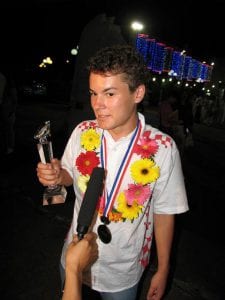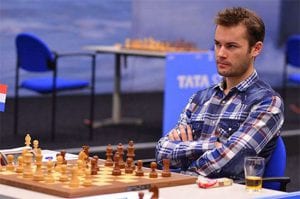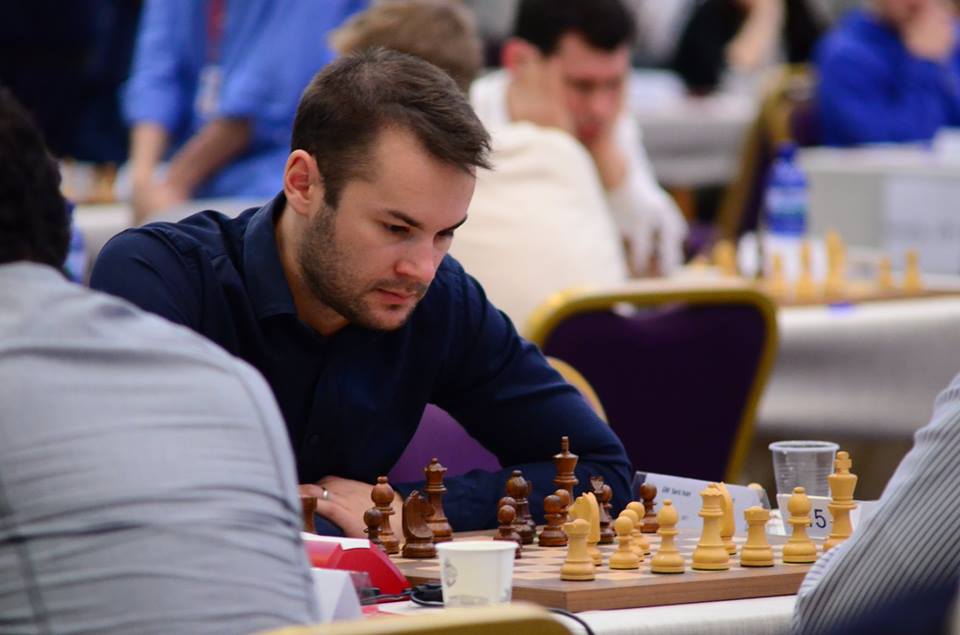IVAN ŠARIĆ
For almost a decade now, Ivan Šarić has been both the top-ranked and the strongest Croatian chess player.
Already back in 2007, he introduced himself to the broader chess public by winning the U-18 World Chess Champion – a tremendous success. Ever since then, he has been rapidly progressing on the World Rating list, achieving notable successes along the way.
His latest and arguably greatest achievement so far happened in March 2018. After grueling 13 rounds and tiresome battles against best Grandmasters of the Old Continents, he became the sole winner of the European Chess Championship 2018.
Immediately after this tremendous achievement*, we asked Ivan for an interview and he very kindly agreed.
Hope you will enjoy it!
*In the meantime, Ivan also won the Croatian Chess Championship 2018
(Cover photo credit: Croatian Chess Federation)
EUROPEAN CHAMPIONSHIP 2018
Q: Hello, Ivan! First of all, we would like to congratulate you once again on your title of the European Champion! How are you feeling now, when the dust has settled? Are you back to reality and everyday routine, or is the moment of euphoria still slightly present?
A: Thank you very much! I feel more tired than usual, but I don’t have much time to relax, because Croatian championship is in a way.
Q: You said your main goal before the tournament was to qualify for the World Cup (Top 23 players gain the right to participate – VN). Did you believe you could aim for more? Did you dream of winning the title beforehand?
A: Yes, qualification was the main goal, or to score plus 4 to be exact, otherwise tournament would be unsuccessful. The second goal was a medal, and winning the tournament was closer to dreams than reality. Anyway, I believed I can win the tournament because in previous championships I had some good results, for example, 2 years ago I was leading the tournament after 6 rounds, and in 2014 I shared 2nd place.

Q: Okay, I would like to talk about your tournament path in the greater detail. It is well known that many surprises happen precisely in the early stages of an Open. How do you usually approach these early rounds? Is it more difficult to „warm up“ in the European Chess Championship where your first „weaker“ opponent was already a 2422 FM?
A: Maybe only first round can be called as a warm-up since in all other rounds you (should) play against a GM. In my experience, I play highest quality chess in early rounds (usually 2-4, round 1 is trickier because of acclimatization) while I’m still completely fresh. The fact you have already decent opponent makes it easier for you in case of a draw or even a loss, because you know that these things can happen easily. In regular opens, everything except winning the first round is a disaster.
Q: In general, is your thought process and approach different when you approach someone who is lower rated? Does it affect your play?
A: The main difference when you play a much lower rated opponent is that only one result satisfies you, a draw is a failure, and I don’t even have to mention loss. I try to play the strongest moves no matter who my opponent is, and I think it doesn’t affect my play.
Q: In any case, after very strong start (3.5/4) came the first critical moment. You faced a fellow Croatian, Grandmaster Marin Bosiočić and won in brilliant style (The final sacrifice of the rook – Rd7! – is well worth noting – VN). In the previous editions of the European Championships, your encounters against Croatians ended peacefully (e.g. Palac – Šarić in 2016 or Brkić – Šarić in 2015). How and when do you guys decide whether you will fight in the game or not? How do you approach such a game against someone you know pretty well?
A: I wouldn’t call this game a brilliant one, although I played perfectly. I was very well prepared, he didn’t defend accurately and quickly I was completely winning. In the position where every move wins I found the quickest and most beautiful way to finish the game. Here in this European Championship, our encounter was still early (5th round) and in fact, nobody even mentioned the draw. In last two Croatian encounters, they were both quite close to the end, rounds 8 and 9, and it made more sense to draw those games and rest. Curiously, both Palac and Brkic later qualified to the World Cup in those Championships.
(Game is given below – VN)
Q: After such a strong start you suffered a pretty convincing loss at the hands of Radoslaw Wojtaszek. Can you tell us a bit what happened in that game? To the outside patzers like me, it seemed that your g5 move was the result of the constant pressure. With hindsight, do you think it was the matter of the opening choice? Was it the matter of misevaluation of the position? Or your opponent simply played a very good game?
A: My opponent chose a venomous and rarely played line, which created me some difficulties early in the opening phase. Now I think that my reaction wasn’t bad, but during the game, I wasn’t sure and I was worried that my passive (but solid) position will crack somehow after 5 – 6 hours of play. I simply misevaluated the position arising after g5 and missed the forced win for white. My intuition was telling me that I will have enough counterplay on the h-file and that I will manage to defend my biggest weakness, pawn on g5. I was wrong and also I should have calculated more before playing such committing move. In the end, my opponent didn’t have a hard task, just to play simple moves and win.
(Game given below – VN)
Q: Did you remember the European Championship 2016 at this point? Did you consciously or subconsciously opt for safety in the next two games, to gain some respite? (In the European Championship 2016, Ivan started with 5.5/6 but then scored only 1.5/5 – VN)
A: Yes, and the positive thing about this loss was that it happened before the free day, not like in 2016. In some strange way, this was a relief. Actually, next two games I played too aggressively in the opening phase, and probably underestimated my opponent in round 8, which lead to the fact that I was trying to save a draw in both of them. I wasn’t far from losing in both, but luckily in the crucial moments, I managed to find best defensive moves.
Q: Okay, but after this, you ended the tournament just like you started it. First of all, a fantastic win against Donchenko, a real positional gem. Most people would say this is not very typical of your attacking, uncompromising style. Would you agree with that assessment? Is it more satisfying to win with a dashing attack or to grind down your opponent in Magnus’ style?
A: Lately, it seems that I’m winning way more games positionally and I endgames than in attacking style. Probably, my opponents are trying to avoid positions where I can attack them, and sometimes they end up in slightly worse positions where I can squeeze the advantage. Every win is satisfying, no matter how you win.
(Game given below – VN)
Q: The rook endgame was particularly beautiful and instructive. Chesscom report even mentioned that endgames are seemingly your strong suit. Would you agree with that observation? How would you rate your endgame technique compared to, say, other 2600, 2700 players?
A: I enjoyed playing it, I was convinced that it should be winning for white because of all the differences between kings. I found all those moves easily and I felt like they were natural. I think that my endgame technique is about average
Q: After this brilliancy, you faced young and rapidly improving German Grandmaster, Svane Rasmus with the Black pieces. Instead of yet another Slav/Queen’s Gambit, you opted for King’s Indian instead. Was this change of hand the result of the game against Wojtaszek? Or you’ve decided it is a better choice against Svane on the basis of your preparation?
A: I’ve chosen King’s Indian because of the concrete variations that Svane played against it. I was happy with a draw in that game because it would practically secure me the World Cup (I would just need a draw with white in last round).
Q: In the game, your opponent employed very aggressive idea, queenside castling against hedgehog. He seemed to have an advantage, but then you stunned him, first with a pawn sacrifice, followed up with a piece sacrifice, which ultimately won the game. Did you think the sacrifice is correct, or you didn’t like your position and decide to take radical measures?
A: I think white can never have an advantage in those type of positions if he castles long. Engines tend to give a plus for white because they appreciate space advantage and often underestimate pawn sacrifices and attacking possibilities for black. I remember I was quite happy and optimistic when he castled long and I thought that my position is better already. Pawn sacrifice is the most typical motif in those structures, and piece sacrifice is normally a motif in dragon type positions where the white pawn is on c2. With the pawn on c4 it should be much stronger for black, but on other hand prevents black from typical exchange sacrifice on c3. When he accepted the piece sacrifice I considered my position as close to winning, which is true, but then I made a blunder which spoiled it completely. Luckily he also missed my inaccuracy.
(Game given below – VN)
Q: And then came the last round and yet another 2700+ opponent – the first seed of the tournament, David Navara. There was a choice to be made – go for safety and qualify for the World Cup or to go all in and have a real shot at the title. How did you approach this game? Was it psychologically difficult to play for the win, since in some crazy scenario you could even fail to qualify?
A: I concluded that draw is not a bad result, but obviously not the most satisfying one. It would have left me without the medal, and now when I was so close, I really wanted to win the medal. There was only theoretical possibility that I fail to qualify in case of losing, but practically impossible. I decided to play my best lines and check what has my opponent prepared.
Q: About the game, I got the feeling Navara is primarily a Caro-Kann player. Did he surprise you with the Sicilian?
A: He plays Sicilian more, and in the European, he played almost exclusively Najdorf variation. I think it suits his style much better than Caro-Kann. But his 2nd move g6 surprised me a lot.
Q: While we are at it, how do you prepare for such a strong opponent? I doubt you just look at his games and repeat the lines like us 2200 players. How do you try to find a weak spot in his armor?
A: Last round was 4 hours earlier than usual, and there wasn’t much time for preparation. I realized that he plays so many lines that it would be impossible to guess his choice. I didn’t even repeat my lines, I just tried to sleep as much as I could.
Q: When you saw other top games ending in draws, did it boost your confidence? Or did it add extra pressure, since the stakes got even higher?
A: I expected some draws, on the board 4 it happened almost immediately. On the board 3 white chose a drawish line, so after 15 min of play, the draw was there an expected result. My confidence was boosted by my opponent’s opening choice.
Q: In any case, you played another beautiful game and after 32 moves, you were a piece up in the endgame. But the conversion was far from easy. How did you manage to remain cool and calm? What thoughts went through your head as you were making your final moves of the game?
A: When we entered the position where I was a piece up, I didn’t know how to evaluate the position. I knew that only white can be better, but didn’t know is it enough for victory. Position, in the end, was so winning, that it was hard to make a mistake (although still possible). I was rechecking my calculation more than I normally do. At some point, I was wondering why my opponent isn’t resigning yet, but then I realized that I should just enjoy my position.
(Game given below – VN)
CAREER
Q: So, that’s how you became European Champion. However, success at the very top level is not unknown to you. European and World Junior Champion, a share of 2nd place in the European Chess Championship 2015, the convincing victory in the Tata Steel B Group 2014, 7/11 in the Tromso 2014 Olympiad, multiple titles of Croatian National Champion and a whole lot of first places in the Open tournaments. Which of these successes is dearest to your heart? Which one was the hardest to achieve?
A: It’s usually the latest one, and this case is not an exception. In general, winning open tournaments is much tougher than winning round robins.

Q: For me personally, victory at Tata Steel B Group 2014 was particularly impressive. 10/13, 1.5 ahead of Jan Timman, perfect score +7-0=6 and victories against strong players such as Wojtaszek and Yu Yangyi. If I am not mistaken, Garry Kasparov himself agitated for you to be invited. Did chess legend’s belief boost your confidence and inspired you to play so well?
A: This was probably the tournament where I played my best chess ever. Garry’s recommendation was part of the deal between the Croatian chess federation and Garry Kasparov at that time, it’s no secret. I think what motivated me most, was the fact that in case of winning the Challengers I will have the chance to play against best players in the world in the most famous tournament in the world.
q: By winning the B-Group, you gained the right to participate in arguably the most prestigious chess tournament in the world – Tata Steel A group 2015. Virtually for the first time, you found yourself playing in a closed tournament against world’s very best (Magnus Carlsen, Maxime Vachier-Lagrave, Anish Giri, Wesley So, Fabiano Caruana and Levon Aronian all participated, among others – VN). How did you prepare for this tournament? Do you have some sort of specific routine when preparing? Did you do anything differently, like hiring someone, this time?
A: Yes, I had a second during that tournament, but preparation before the tournament wasn’t much different than usual.
Q: What were your pre-tournament expectations? Did you feel some extra pressure because you don’t get these chances that often, or did you simply enjoy being one of the underdogs? Did the huge press coverage and publicity affect your play?
A: I had expected definitely more than I achieved, and I was really unhappy with my play there. I liked the fact that I’m an underdog and that I don’t have much to lose. It seemed like a great opportunity to gain more rating points and reputation in the chess world. Outside factors didn’t affect my play.
Q: In the end, the score was not brilliant (4.5/11, +2-6=5), but in my humble opinion, it didn’t reflect the events on the board. In a number of drawn games, you were doing quite decently at one point (e.g. against Aronian or Van Wely) and there was this unfortunate blunder against Maxime Vachier Lagrave. How do you evaluate your play and your result there?
A: I had one horrible blunder where instead of going for the draw, I mated myself. In general, my play was far from good also. I played terrible games against Hou (even managed to draw that one), Ding, So, Giri, Radjabov (probably the worst one). The play in those games was bad for an IM level, not to mention how bad it was for me. I felt embarrassed, so in the end, I think my score was better than my play, but my play was miles from my best one.
Q: How difficult it is to play such an event in contrast to a regular open? One day you lose to a 2700+ player and next day you face another one. Is it terrifying to play one game after another without a respite at all?
A: There were a lot of free days, more than in any open tournament or any other event that I know. It’s difficult if you are in bad shape like I was. One mistake against those players usually means that the game is over. I managed to avoid complete disaster by winning the penultimate round against Wojtaszek and drawing against World champion in last round.

Q: But, in general, the whole 2014-2015 period was extremely successful for you (the crown being your victory and a draw against the World Champion himself). You peaked twice (November 2014 – 2680 ELO and October 2015 -2678 ELO). Many people expected you to finally break that magical 2700 barrier, but then you reached some sort of a slump, that lasted all the way to April 2017, where you reached 2609 ELO, the lowest since January 2011. Can you explain a bit what happened there? Was it just the matter of bad luck and temporary loss of form, or were there external factors that caused you to work on chess less than usual?
A: The best chess of my career I played in 2014, until now. This year could be the one which will surpass 2014.
Firstly, I lost some rating points, mostly to my very bad play in Bundesliga in those seasons. Then I was more or less stuck around 2650 for a longer period. Then February 2017 appeared where I lost 40 points (33 at Aeroflot open) in two weeks. Reason for my bad play was not the time spent on training chess. It was almost exclusively some other factors.
Q: But okay, after this European Championship, you have fully recovered, and once again reached your peak rating of 2677. What are your future plans now? Do you have some sort of short and long-term goals?
A: I have my tournament calendar planned almost until the end of the year. I think everyone knows that my next goal is reaching the rating of 2700 or more. And more importantly to keep that level of play.
CHESS TRAINING
Q: Now when we have mentioned peaks and ratings, how does a typical training regiment of a 2670 player look like? What is the main difference between a 2600 and a 2700 player?
A: The simplest answer why some people have a higher rating than other ones is because they play better chess on average. If you have two normal players with a rating difference of 100 points, and for example, they both play around 100 games per year, it means that in classical 9 round tournament stronger player will score one point more in average.
In the concrete case, 2700 players don’t have weak parts of their play. Most of the 2600 players usually have some slight weakness in their play, either openings/endgames, or know only how to play aggressively / positionally.
Q: Which aspect of the game do you consider as your weakest part? How do you intend to improve it?
A: Around move 40 I often make mistakes, even when I’m not in time trouble. My evaluation of the position is usually not objective one, but I’m not sure is this is a bad thing.
Q: How does your typical training routine look like when you are not competing in a tournament? How many hours per day do you spend on chess? What do you do?
A: I usually analyze on the board with the help of the computer, and when it becomes tiring and boring I play some online blitz in breaks between. The goal is to play minimum blitz and do maximum real work, but sometimes I catch myself playing more than 3-4 hours of blitz and feel like I completely wasted my day.
Q: Do you read chess books? Do you have a favourite chess book?
A: Yes, currently puzzle types of books where I can exercise my vision.
Q: Do you have a favourite player? Who is your role model in chess?
A: Not really. Even if I had one I couldn’t copy him because every player has a unique understanding of chess.
Q: In an ancient interview in Slobodna Dalmacija, you mentioned you play 100-120 games a year. Do you analyze your own games? Do you even have time to look at them thoroughly?
A: Now I play around 100 classical games per year. I always check them with the engine. I analyze deeply only games which I consider significant for the opening theory and critical for my repertoire.
Q: How would you rank these in order of importance?
- Practicing on a computer
- Practice matches with other human opponents
- Analyzing your own games
- Analyzing classical games
- Reading chess books
A:
1. Analyzing your own games
2. Reading chess books
3. Practice matches with other human opponents
4. Practice on a computer
5. Analyzing classical games
Q: One of the things I have noticed is that top players have huge teams behind them. Do you have some sort of trainer? Someone you work with on a regular basis?
A: Currently no one, but I hope this will be solved in near future. I have some sparing partners and colleagues with whom I sometimes practice, but no second.
OFF THE BOARD
Q: In the last part of the interview, I would like to talk a bit about matters unrelated to chess. You are living in Omiš with your wife and daughter, studying in Split and playing chess around the world? How difficult it is to find the „work-life“ balance considering that the life of chess professional is pretty „boemic“?
A: No, I’ve returned back to Split. I’m not in the university for almost 4 years. I got bachelor’s degree in 2013 and quickly after I stopped because I had no time to attend all the classes.
Q: Your wife is also a chess player. Do you guys travel to tournaments together? Or only in those where both of you are playing?
A: My wife is working, and she almost stopped playing chess actively. But at least once a year we go to some tournament together.

Q: How did this dynamic change when your daughter was born? Did she already learn how to play?
A: I played just a little bit fewer games in those first 2 years than usual, but quickly I returned to my normal rhythm (around 100 games per year). She learned to play chess, but has other interests which she enjoys more.
Q: Correct me if I am wrong, but I have heard you have diabetes mellitus type 1. It makes your career and your results even more impressive. My best friend also ‘discovered’ he has one when he was 14. Although I know to an extent how difficult it is for him to pursue any sport, I can’t imagine what a chessplayer has to go through, considering chess games often last for 6 or 7 hours. How do you control the sugar level during the game?
A: I have it since I was 11 and I was used to playing chess alongside with diabetes whole my career. I control the glucose before the game and that’s it, usually, your body is telling you how your glucose levels are, and I can feel correctly in most of the cases. It’s impossible of course to guess correctly your current levels, but you feel when is low, normal or high.
Q: Does it affect your performance on an occasion? Do you lose concentration? How difficult is it to endure these setbacks?
A: It’s hard to say, most of my mistakes are simply chess related, and very few times I made blunders because my sugar level was low. Normally, when I feel this situation I try to not make a move or calculate anything deeply until glucose goes back to normal. On the other hand, when blood sugar is high you usually feel tired and sleepy and when this happens you obviously don’t play your best chess.
Q: Apart from chess and family, do you have some other ‘hobbies’ and interests? How do you spend your free time?
A: Most of my free time I spend with my family, mostly we go hiking. Besides chess, I do physical training but this can’t be called a hobby, because its purpose is to benefit my chess and health.
Q: Which non-chess book can be found on your night locker at this very moment?
A: Only some books which my daughter or wife are reading.
Q: Which sports do you follow? Many chess players are big NBA junkies. Also, I would be quite surprised if you weren’t a huge Hajduk fan. Do you visit Poljud nowadays when you get a chance? Were you a member of Torcida in your younger days (Torcida is the name of Hajduk’s fans – VN)?
A: Nowadays I follow only Champions league and matches of Hajduk. Last time I was at the stadium was more than one year ago.
Q: In the end, which message would you send to young, aspiring players and chess connoisseurs?
A: To analyze positions (and openings) on the board, without the engines.
Q: Okay, thank you very much for your time and your answers Ivan. We wish you all the best in the future and we hope you will join the 2700+ club very soon. Good luck!
A: Thank you!

